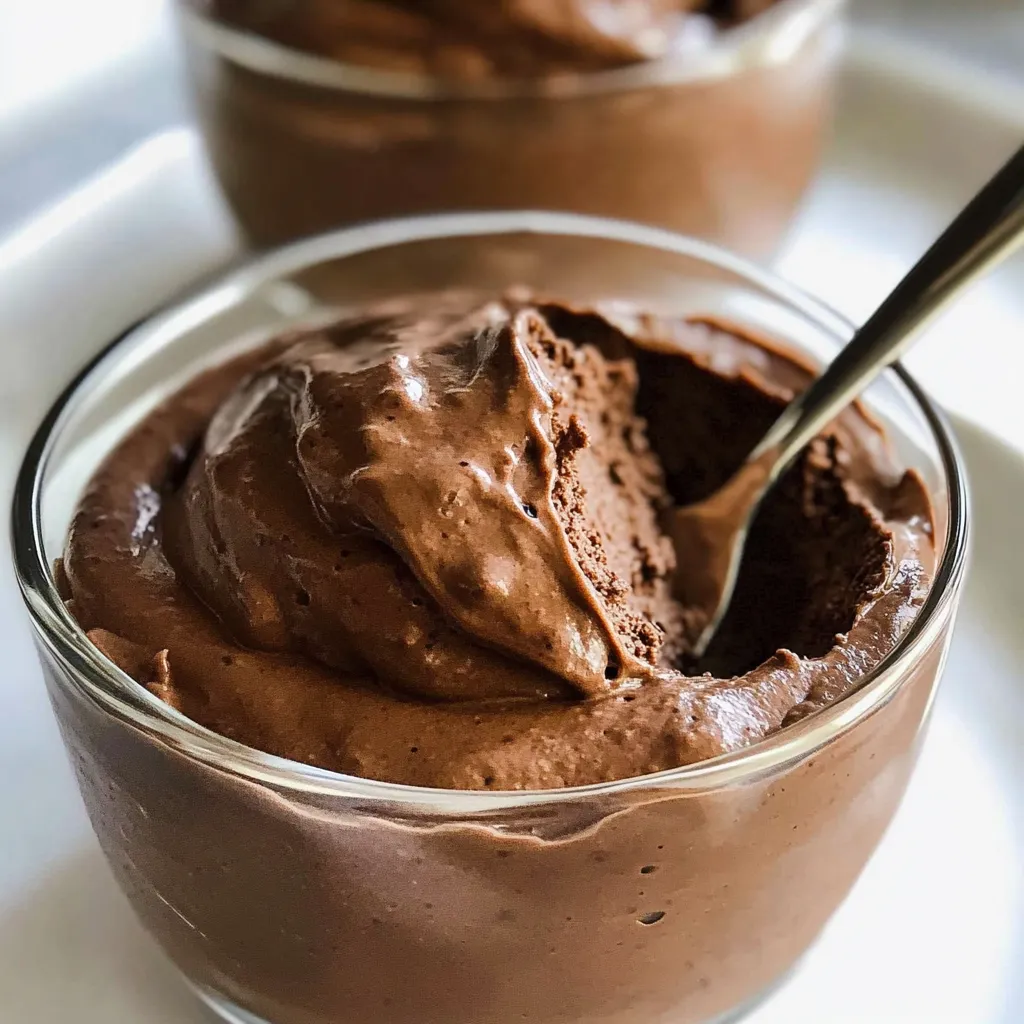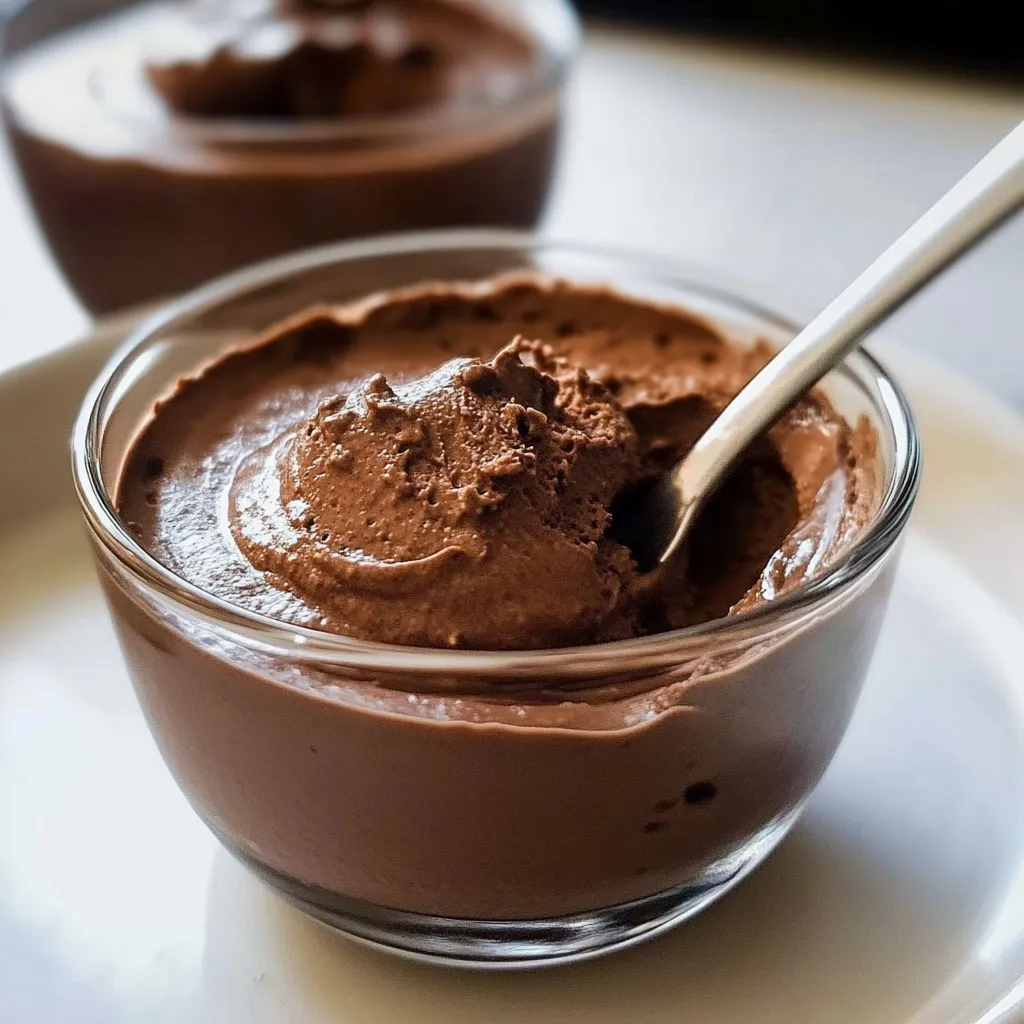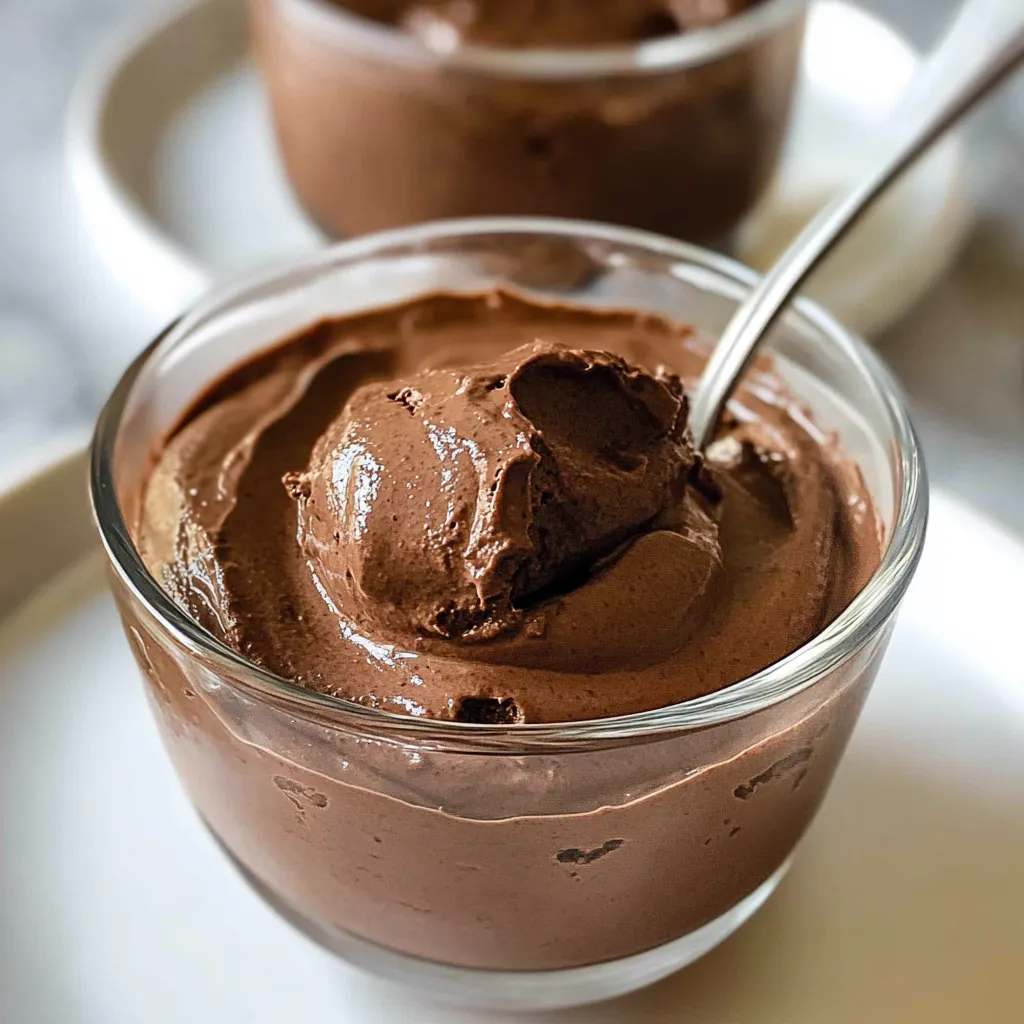 Pin it
Pin it
Chocolate mousse delivers an exquisite combination of rich cocoa depth and ethereal lightness that satisfies intense chocolate cravings without the heaviness of traditional desserts. This classic French creation balances decadent chocolate flavor with a cloud-like texture that melts effortlessly on your tongue. Each spoonful offers the perfect harmony of indulgence and delicacy—substantial enough to feel truly satisfying yet airy enough to leave you feeling pleasantly content rather than overwhelmed.
The beauty of a well-crafted chocolate mousse lies in its perfect structural balance, achieved through the careful incorporation of whipped cream and beaten eggs that create millions of tiny air bubbles suspended in a chocolate matrix. This scientific marvel translates to a sensory experience that feels simultaneously rich and light, intensely chocolatey yet delicately textured.
I discovered the transformative power of using ultra-dark chocolate in mousse during a dinner party preparation when I realized I only had 85% cocoa chocolate on hand. What began as a potential disaster became a revelation—the intense chocolate flavor created remarkable depth without excessive sweetness. My guests were astonished by how prominently the chocolate flavor shone through the creamy texture. My typically dessert-avoiding brother-in-law actually requested the recipe, commenting that it was the first chocolate dessert he'd enjoyed in years because it wasn't "sickeningly sweet."
Essential Components
- Heavy whipping cream: Creates the signature airy texture and contributes rich mouthfeel. Cold cream whips to greater volume, so keep it refrigerated until ready to use.
- Dark chocolate: Provides the primary flavor and helps set the mousse. Higher cocoa percentage (at least 70%) delivers more intense chocolate flavor and less sweetness.
- Eggs: Contribute richness and structure while adding volume through aeration. Both yolks and whites play crucial roles in the perfect mousse texture.
- Gelatin sheets: Help stabilize the mousse for a consistently silky texture that holds its shape. They provide insurance against weeping or collapsing.
- Granulated sugar: Balances the bitterness of dark chocolate without overwhelming it. The amount can be adjusted based on chocolate percentage and personal preference.
- Vanilla extract: Enhances and rounds out the chocolate flavor with subtle aromatic notes. Pure extract provides cleaner flavor than imitation.
Preparation Method
- Cream whipping:
- Begin by whipping cold heavy cream in a large, chilled mixing bowl until soft peaks form. The cream should hold its shape when the beater is lifted but still have a slightly soft, billowy texture rather than appearing stiff or dry. Refrigerate the whipped cream while preparing other components to maintain its structure.
- Chocolate melting:
- Chop dark chocolate into small, uniform pieces to ensure even melting, then place in a heat-resistant bowl. Melt using a double boiler or microwave in short 30-second intervals, stirring between each until completely smooth. Allow to cool slightly but maintain fluidity—approximately 110°F is ideal. Proper temperature ensures the chocolate incorporates smoothly without seizing.
- Gelatin preparation:
- Submerge gelatin sheets in cold water until they soften and become pliable, usually 5-10 minutes. This "blooming" process hydrates the gelatin for proper dissolution later. Once softened, gently squeeze excess water from the sheets before incorporating them into the recipe.
- Egg mixture creation:
- Combine egg yolks, whole eggs, vanilla extract, and sugar in a heat-resistant bowl. Place over a pot of gently simmering water, creating a double-boiler effect, and whisk continuously until the mixture thickens and reaches approximately 60°C (140°F). This process, called tempering, safely cooks the eggs while maintaining their ability to incorporate air.
- Volume development:
- Transfer the warm egg mixture to a stand mixer fitted with the whisk attachment, or use an electric hand mixer. Beat at high speed until the mixture expands dramatically, becoming very light in color and at least tripling in volume. This extended beating creates the foundation for the mousse's airy structure.
- Gelatin incorporation:
- After squeezing excess water from the bloomed gelatin sheets, melt them gently using a warm water bath. Slowly add the melted gelatin to the whipped egg mixture while beating on high speed. This even distribution prevents gelatin from setting prematurely in concentrated spots.
- Chocolate integration:
- Reduce mixer speed to low and gradually add the melted chocolate to the egg mixture, mixing just until combined. Over-mixing can deflate the air bubbles essential to proper texture. The mixture should maintain its volume while taking on a uniform chocolate color.
- Gentle folding:
- Using a large spatula, carefully fold the chocolate-egg mixture into the reserved whipped cream, adding about one-third at a time. Use a down-across-up-over motion, rotating the bowl as you work, to preserve as much air as possible while achieving even distribution. The result should be a uniform light-brown mixture with no white streaks.
- Portion presentation:
- Divide the mousse among individual serving dishes, creating a smooth surface with the back of a spoon or an offset spatula. For special occasions, pipe the mousse using a pastry bag fitted with a large star or round tip for more elegant presentation.
- Proper setting:
- Cover each portion with plastic wrap placed directly on the surface to prevent skin formation. Refrigerate for at least 2 hours, preferably overnight, to allow the gelatin to set completely and the flavors to meld. This waiting period dramatically improves both texture and flavor.
 Pin it
Pin it
I discovered a wonderful variation of this recipe when preparing for a dinner party during berry season. Adding a tablespoon of Grand Marnier to the egg mixture created subtle orange notes that complemented the chocolate beautifully. Another successful experiment involved folding a half cup of fresh raspberries into the final mousse just before portioning, which created bright pops of flavor against the rich chocolate. My guests couldn't stop commenting on these thoughtful enhancements, with several mentioning that it was the best chocolate dessert they'd ever tasted!
Serving Suggestions
Present this elegant dessert in clear glass vessels to showcase its beautiful texture and color. For formal dinners, serve in stemmed glasses or coupe dishes; for casual gatherings, small mason jars create charming individual portions. The deep chocolate color looks particularly striking against white porcelain or glass serveware.
This mousse welcomes thoughtful garnishes that enhance its elegant simplicity. Consider a light dusting of cocoa powder, a few fresh berries, a small mint sprig, or delicate chocolate curls. For special occasions, a thin shard of tempered chocolate or a gold leaf adds dramatic flair without overwhelming the mousse's delicate texture.
Consider complementary beverages that enhance the chocolate experience—a small glass of port wine creates harmony with the dark chocolate notes, while an espresso offers delightful bitter contrast. For family gatherings, a glass of cold milk provides the classic refreshing counterpoint to rich chocolate.
Flavor Variations
Transform this versatile dessert with thoughtful adaptations that maintain its luxurious texture while offering new flavor experiences. For a sophisticated twist, add 2 tablespoons of strong espresso to the melted chocolate, creating a mocha mousse that pairs beautifully with coffee service.
Spice enthusiasts might appreciate adding a quarter teaspoon of cinnamon and a pinch of cayenne to the egg mixture before cooking. This subtle heat builds gradually, creating an interesting counterpoint to the rich chocolate without overwhelming the palate.
For holiday gatherings, incorporate a half teaspoon of peppermint extract into the chocolate mixture, then fold in finely crushed candy canes just before portioning. The refreshing mint and subtle crunch create a festive adaptation perfect for winter celebrations.
Orange and chocolate lovers can add the zest of one orange to the cream before whipping and a tablespoon of orange liqueur to the egg mixture. This classic flavor combination offers sophisticated brightness that cuts through the richness beautifully.
Storage Guidance
Maintain optimal freshness by storing this mousse properly covered in the refrigerator. Individual portions should be wrapped with plastic film pressed directly onto the surface to prevent skin formation or absorption of refrigerator odors. When properly stored, mousse maintains peak quality for up to three days.
For make-ahead convenience, prepare the mousse up to two days before serving. The flavor actually improves after the first day as the chocolate notes develop more fully. This makes it an ideal dessert for entertaining when time management is essential.
This delicate dessert does not freeze well due to its high air content and cream base. Freezing causes the water molecules to expand and rupture the delicate structure, resulting in weeping and texture compromise upon thawing. Always serve fresh for the ideal experience.
If preparing components in advance, the melted chocolate can be held at room temperature for several hours before incorporation, and the whipped cream can be refrigerated for up to two hours before folding. However, once combined, the mousse should be portioned promptly before the gelatin begins to set.
The creamiest chocolate mousse represents the perfect balance between indulgence and elegance. Its silky texture and intense chocolate flavor create a dessert experience that feels luxurious without being heavy or overwhelming. I particularly appreciate how this classic French creation transforms simple ingredients—chocolate, eggs, cream—into something that feels so much greater than the sum of its parts. Whether served as the conclusion to an elaborate dinner party or as a special weeknight treat, chocolate mousse provides that perfect moment of pure pleasure that reminds us why dessert exists in the first place.
 Pin it
Pin it
Frequently Asked Questions
- → Can I make this mousse without gelatin?
- Yes, you can omit the gelatin, but your mousse won't be quite as stable. Refrigerate it for longer (at least 4 hours) and serve in glasses rather than unmolding it for the best presentation.
- → What type of dark chocolate works best?
- Use a high-quality dark chocolate with 60-70% cocoa content for the best flavor. Chocolate chips contain stabilizers that affect melting, so bar chocolate chopped into pieces works better.
- → Can I make this mousse ahead of time?
- Absolutely! This mousse actually improves with time as the flavors develop. You can make it up to 2 days ahead and keep it covered in the refrigerator.
- → Is it safe to eat because of the raw eggs?
- The egg mixture is partially cooked to about 140°F in a double boiler, which reduces risk. For complete safety, especially for pregnant women, elderly, or immunocompromised individuals, use pasteurized eggs.
- → Why did my mousse separate or become grainy?
- This usually happens if the chocolate was too hot when added to the mixture or if the eggs were overcooked. Make sure the chocolate has cooled slightly and that you whisk the egg mixture constantly while heating.
- → What can I add for extra flavor?
- Try adding a tablespoon of coffee liqueur, a pinch of cinnamon, or some orange zest. For a more adult version, a splash of Grand Marnier or bourbon works beautifully with the chocolate.
